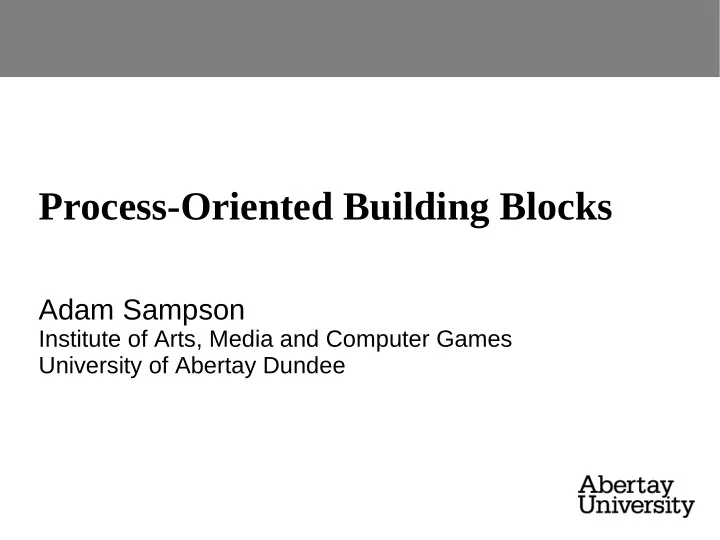

Process-Oriented Building Blocks Adam Sampson Institute of Arts, Media and Computer Games University of Abertay Dundee
Threading Building Blocks ● Open-source C++ library from Intel ● Intended to replace OpenMP (more or less) in compute-heavy parallel applications – e.g. parallel_for(0, 10, some_function); ● … but it's actually quite sophisticated underneath: – Built on non-preemptible tasks – Work-stealing multicore scheduler – API for submitting raw tasks, groups, etc. – Portable atomics, threads
Continuation-passing style ● You can abuse the scheduler to do concurrent (rather than parallel ) programming... ● … by writing in continuation-passing style ● So you can fairly easily knock up an implementation of channels on top of TBB...
PROC element (CHAN INT this?, next!) class Element { INITIAL INT token IS 1: public: WHILE token <> 0 Element(pobb::channel<int>& cthis, SEQ pobb::channel<int>& cnext) this ? token : cthis_(cthis), cnext_(cnext), IF token_(1) { token > 0 } next ! (token + 1) tbb::task *start() { TRUE if (token_ != 0) { next ! token return cthis_.read(&token_, : pobb::make_cont(*this, &Element::handle)); } else { return 0; } } tbb::task *handle() { if (token_ > 0) { return cnext_.write(token_ + 1, pobb::make_cont(*this, &Element::start)); } else { return cnext_.write(token_, pobb::make_cont(*this, &Element::start)); } } private: pobb::channel<int>& cthis_; pobb::channel<int>& cnext_; int token_; };
PROC element (CHAN INT this?, next!) class Element { INITIAL INT token IS 1: public: WHILE token <> 0 Element(pobb::channel<int>& cthis, SEQ pobb::channel<int>& cnext) this ? token : cthis_(cthis), cnext_(cnext), IF token_(1) { token > 0 } next ! (token + 1) tbb::task *start() { TRUE if (token_ != 0) { next ! token return cthis_.read(&token_, : pobb::make_cont(*this, &Element::handle)); } else { return 0; } Eww. } tbb::task *handle() { if (token_ > 0) { return cnext_.write(token_ + 1, It works, but I pobb::make_cont(*this, &Element::start)); wouldn't want to } else { return cnext_.write(token_, have to do this for pobb::make_cont(*this, &Element::start)); anything non- } } trivial... private: pobb::channel<int>& cthis_; pobb::channel<int>& cnext_; int token_; };
CPC ● This kind of translation is pretty mechanical... someone must have done this already, right? – (Pretty close to what SPoC does, in fact) ● Enter Gabriel Kerneis' Continuation-Passing C – Adds cps annotations to C: this function might be descheduled – so translate to CPS – Portable translator to ANSI C – Includes a very simple, single-core scheduler cpc void server_process(int fd) {...} cpc void main_loop() { while (true) { int fd = accept(sock); cpc_spawn(server_process(fd)); } }
TBB + CPC + pobb.h = POBB ● I replaced CPC's scheduler with a wrapper around TBB's low-level interface – … pretty straightforward – CPC's generated code is thread-safe, but many applications aren't – assume only one thread ● I reimplemented (some of!) KRoC's “CIF” library of process-oriented primitives – ChanOut , etc. – … can just translate CCSP's algorithms
PROC element (CHAN INT this?, next!) cps void element (Channel *this, INITIAL INT token IS 1: Channel *next) { WHILE token <> 0 int token = 1; SEQ this ? token while (token != 0) { IF ChanInInt (this, &token); token > 0 if (token > 0) { next ! (token + 1) ChanOutInt (next, token + 1); TRUE } else { next ! token ChanOutInt (next, token); : } } }
static struct cpc_continuation *element(struct cpc_continuation *cpc_cont ) ; And it generates all this struct element_arglist { int this __attribute__((__aligned__(16))) ; for you... }; __inline static struct cpc_continuation *element_push(int this , struct cpc_continuation *cpc_cont_2732 ). {. struct element_arglist *cpc_arglist1 ; { cpc_arglist1 = (struct element_arglist *)cpc_alloc(& cpc_cont_2732, (int )sizeof(struct element_arglist )); cpc_arglist1->this = this; cpc_cont_2732 = cpc_continuation_push(cpc_cont_2732, (cpc_function *)(& element)); return (cpc_cont_2732); } } struct cpc_continuation *__element_pc22(struct cpc_continuation *cpc_cont ) ; struct __element_pc22_arglist { int next ; int this ; int *token __attribute__((__aligned__(16))) ; }; __inline static struct cpc_continuation *__element_pc22_push(int next , int this , int *token , struct cpc_continuation *cpc_cont_2737 ). {. struct __element_pc22_arglist *cpc_arglist1 ; { cpc_arglist1 = (struct __element_pc22_arglist *)cpc_alloc(& cpc_cont_2737, (int )sizeof(struct __element_pc22_arglist )); cpc_arglist1->next = next; cpc_arglist1->this = this; cpc_arglist1->token = token; cpc_cont_2737 = cpc_continuation_push(cpc_cont_2737, (cpc_function *)(& __element_pc22)); return (cpc_cont_2737); } } struct cpc_continuation *__element_pc23(struct cpc_continuation *cpc_cont ) ; struct __element_pc23_arglist { int next ; int this ; int *token __attribute__((__aligned__(16))) ; }; // … and so on
PROC element (CHAN INT this?, next!) cps void element (Channel *this, INITIAL INT token IS 1: Channel *next) { WHILE token <> 0 int token = 1; SEQ this ? token while (token != 0) { IF ChanInInt (this, &token); token > 0 if (token > 0) { next ! (token + 1) ChanOutInt (next, token + 1); TRUE } else { next ! token ChanOutInt (next, token); : } } } That I can live with... I've ported over most of the CCSP benchmark suite – including agents
Conclusions ● You can write concurrent programs in portable C ● Use TBB's multicore work-stealing scheduler ● Easy to add new synchronisation objects ● Combine with TBB's existing smart data-parallel functions ● Performance seems good – no proper analysis – … which is why this is a fringe presentation! ● Minor downside: I ran into some problems with CPC's translator – but should be fixable ● If this sounds interesting, talk to me...
Recommend
More recommend